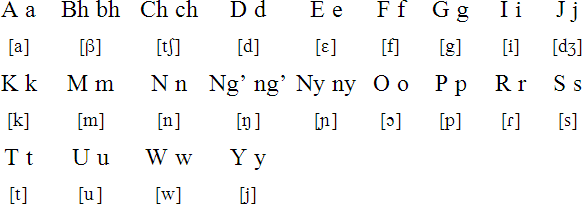Jita is a Northeast Bantu language spoken by about 210,000 people in the Mara Region in northern Tanzania, on the southeastern shore of Lake Victoria / Nyanza, and on the island of Ukerewe.
Jita is also known as Echijita or Ecijiita or Ecijita or Kijita. The people who speak it call it Ecijita and themsleves Wajita. It is closely related to the Kwaya and Ruri languages, and is written with the Latin alphabet.

Kara awo mu-chaaro cha Emajita bhaariga bhari-wo abhamura abhabhiri, owumwi ^naatogwa Nyamanyimooche, owundi ^naatogwa Muyigasiku. Nyamanyimooche na Muyigasiku bhaariga bheekasyanyiisye aamwi oruguyo orumwi.
Once upon a time in the country of Majita there were two young boys, one named Nyamanyimooche, the other was called Muyigasiku. Nyamanyimooche and Muyigasiku were neighbors in one village.
Some details of Jita provided by Michael Peter Füstumum
Information about Jita
https://en.wikipedia.org/wiki/Jita_language
https://lughayangu.com/jita
https://www.sil.org/resources/search/language/jit/
http://www.language-archives.org/language/jit
Aka, Bafaw-Balong, Bangi, Basaa, Bemba, Bembe, Bena, Benga, Bhaca, Bube, Bukusu, Bulu, Central Teke, Chichewa, Chokwe, Chuwabu, Comorian, Dciriku, Digo, Duala, Eton, Ewondo, Fang, Ganda/Luganda, Gogo, Gusii, Gwere, Haya, Hehe, Herero, Ibinda, Ikizu, Ikoma, Jita, Kabwa, Kako, Kamba, Kiga, Kikuyu, Kimbundu, Kinyarwanda, Kirundi, Kisi, Kogo, Komo, Kongo, Konjo, Koti, Kukuya, Kunda, Kuria, Kwambi, Lambya, Lingala, Loma, Lozi, Luba-Katanga, Luchazi, Lunda, Luvale, Luyana, Makaa, Makonde, Makhuwa, Mandekan, Maore, Masaaba, Mbama, Mbere, Mbukushu, Mbunda, Mbuun, Mende, Mongo, Mpiemo, Mushungulu, Mwani, Nambya, Nande, Ngoni, Nkore, North Teke, Northern Ndebele (South Africa), Northern Ndebele (Zimbabwe), Northern Sotho, Nyamwezi, Nyakyusa, Nyemba, Nyole, Nyoro, Nyungwe, Nzadi, Oroko, OshiWambo, Pagibete, Punu, Ronga, Safwa, Sena, Sengele, Shona, Soga, Songe, Southern Ndebele, Southern Sotho, Sukuma, Swahili, Swati, Tanga, Tembo, Tonga, Tooro, Tshiluba, Tsonga, Tswa, Tswana, Tumbuka, Umbundu, Venda, Vili, Vwanji, Xhosa, Yakam, Yansi, Yao, Yasa, Yeyi, Zigula, Zinza, Zulu
Languages written with the Latin alphabet
Page last modified: 27.01.25
[top]
You can support this site by Buying Me A Coffee, and if you like what you see on this page, you can use the buttons below to share it with people you know.

If you like this site and find it useful, you can support it by making a donation via PayPal or Patreon, or by contributing in other ways. Omniglot is how I make my living.
Note: all links on this site to Amazon.com, Amazon.co.uk
and Amazon.fr
are affiliate links. This means I earn a commission if you click on any of them and buy something. So by clicking on these links you can help to support this site.
[top]